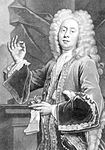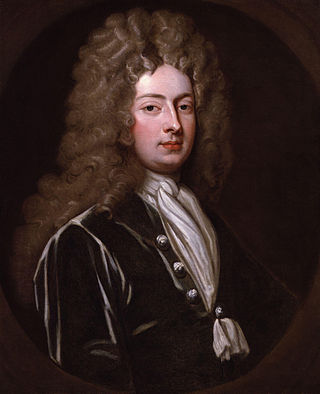
William Congreve was an English playwright, poet and Whig politician. His works, which form an important component of Restoration literature, were known for their use of satire and the comedy of manners genre. Notable plays he wrote include The Old Bachelor (1693), The Double Dealer (1694), Love for Love (1695), The Mourning Bride (1697) and The Way of the World (1700). He died in London, and was buried at the Poets' Corner in Westminster Abbey.

Sir John Vanbrugh was an English architect, dramatist and herald, perhaps best known as the designer of Blenheim Palace and Castle Howard. He wrote two argumentative and outspoken Restoration comedies, The Relapse (1696) and The Provoked Wife (1697), which have become enduring stage favourites but originally occasioned much controversy. He was knighted in 1714.
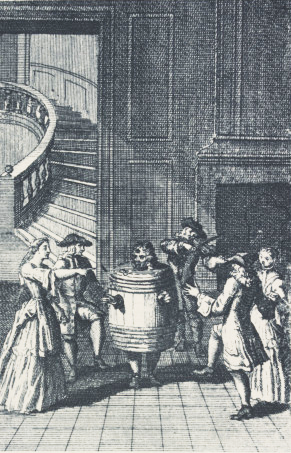
"Restoration comedy" is English comedy written and performed in the Restoration period of 1660–1710. Comedy of manners is used as a synonym for this. After public stage performances were banned for 18 years by the Puritan regime, reopening of the theatres in 1660 marked a renaissance of English drama. Sexually explicit language was encouraged by King Charles II (1660–1685) personally and by the rakish style of his court. Historian George Norman Clark argues:
The best-known fact about the Restoration drama is that it is immoral. The dramatists did not criticize the accepted morality about gambling, drink, love, and pleasure generally, or try, like the dramatists of our own time, to work out their own view of character and conduct. What they did was, according to their respective inclinations, to mock at all restraints. Some were gross, others delicately improper.... The dramatists did not merely say anything they liked: they also intended to glory in it and to shock those who did not like it.

The Relapse, or, Virtue in Danger is a Restoration comedy from 1696 written by John Vanbrugh. The play is a sequel to Colley Cibber's Love's Last Shift, or, The Fool in Fashion.
This article contains information about the literary events and publications of 1700.
This article contains information about the literary events and publications of 1698.

Jeremy Collier was an English theatre critic, non-juror bishop and theologian.
Susanna Verbruggen, aka Susanna Mountfort, was an English actress working in London.
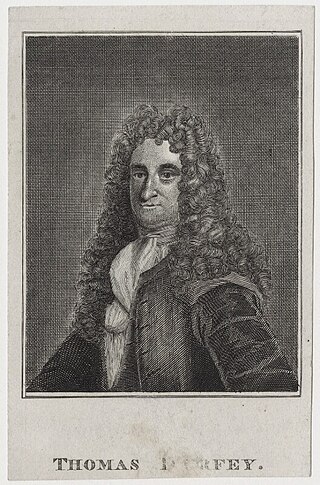
Thomas d'Urfey was an English writer and playwright. He wrote plays, songs, jokes, and poems. He was an important innovator and contributor in the evolution of the ballad opera.

The Provoked Wife (1697) is the second original comedy written by John Vanbrugh. It made its first appearance in Lincoln's Inn Fields in May, 1697. The premise of the plot, of a wife trapped in an abusive marriage might consider either leaving it or taking a lover, outraged some sections of Restoration society. A later unfinished play by Vanbrugh was completed by Colley Cibber and staged under the title The Provoked Husband in 1728.
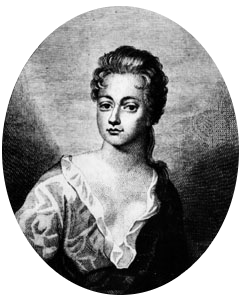
Anne Bracegirdle was an English actress.
Mary Kent was an English actress, whose career lasted from 1692 to 1718. Her dates of birth and death are not known. She was the wife of Drury Lane actor Thomas Kent.
Michael Cordner is an academic, author, and specialist in theatre and drama.

The Society for the Reformation of Manners was founded in the Tower Hamlets area of London in 1691. Its aims were the suppression of profanity, immorality, and other lewd activities in general, and of brothels and prostitution in particular. The society flourished until the 1730s and was briefly revived during 1757.

Drama is the specific mode of fiction represented in performance: a play, opera, mime, ballet, etc., performed in a theatre, or on radio or television. Considered as a genre of poetry in general, the dramatic mode has been contrasted with the epic and the lyrical modes ever since Aristotle's Poetics —the earliest work of dramatic theory.

Amphitryon is an English language comedy by John Dryden which is based on Molière's 1668 play of the same name which was in turn based on the story of the Greek mythological character Amphitryon as told by Plautus in his play from ca. 190-185 B.C. Dryden's play, which focuses on themes of sexual morality and power, premiered in London in 1690. Notable innovations in Dryden's adaptation compared to previous plays on Amphitryon included music by Henry Purcell and the character of Phaedra, who flirts with Sosia but is eventually won over by Mercury's promises of wealth.
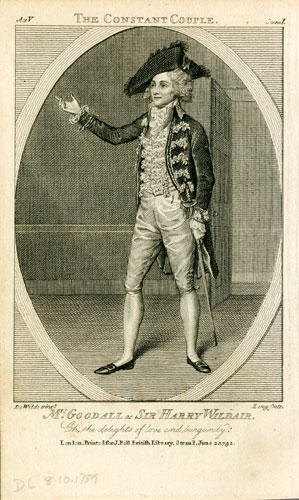
Sentimental comedy is an 18th-century dramatic genre which sprang up as a reaction to the immoral tone of English Restoration plays. In sentimental comedies, middle-class protagonists triumphantly overcome a series of moral trials. These plays aimed to produce tears rather than laughter and reflected contemporary philosophical conceptions of humans as inherently good but capable of being led astray by bad example. By appealing to his noble sentiments, a man could be reformed and set back on the path of virtue. Although the plays contained characters whose natures seemed overly virtuous and whose problems were too easily resolved, they were accepted by audiences as truthful representations of the human predicament.
Elizabeth Willis (c.1669-1739) was a British stage actress.
George Bright was an English stage actor of the seventeenth and early eighteenth century. He specialised in playing "comic dullards, fops and bouncy servants". After beginning his career in Dublin he joined the Duke's Company at the Dorset Garden Theatre in 1679 and then became part of the merged United Company in 1682.
Elizabeth Bowman was an English stage actor of the seventeenth and early eighteenth century. The daughter of Sir Francis Watson, 1st Baronet she was adopted by the actor manager Thomas Betterton. In 1692, she married John Bowman and began acting at Drury Lane the following year as Mrs Bowman. She was a member of the United Company until 1695 then joined Betterton's breakaway at the Lincoln's Inn Fields Theatre.











